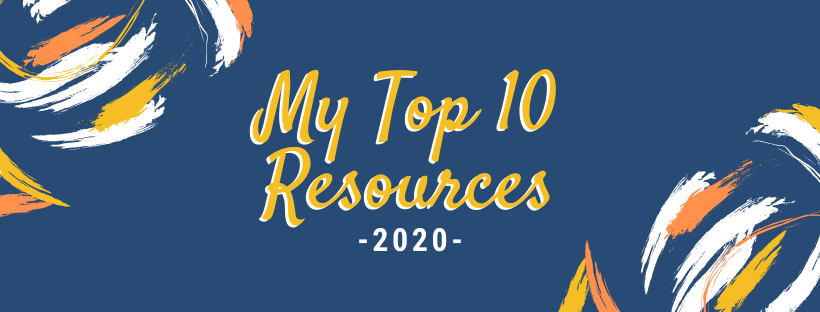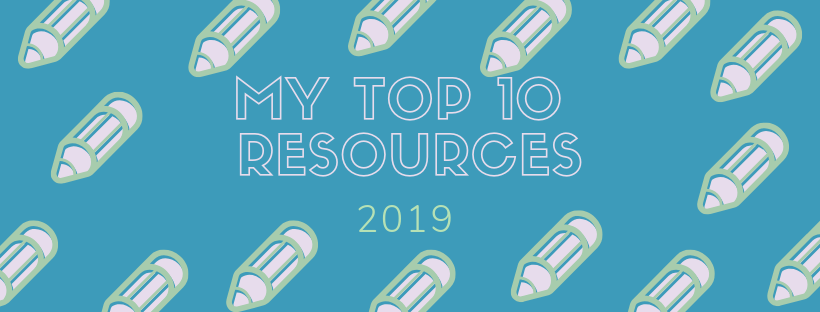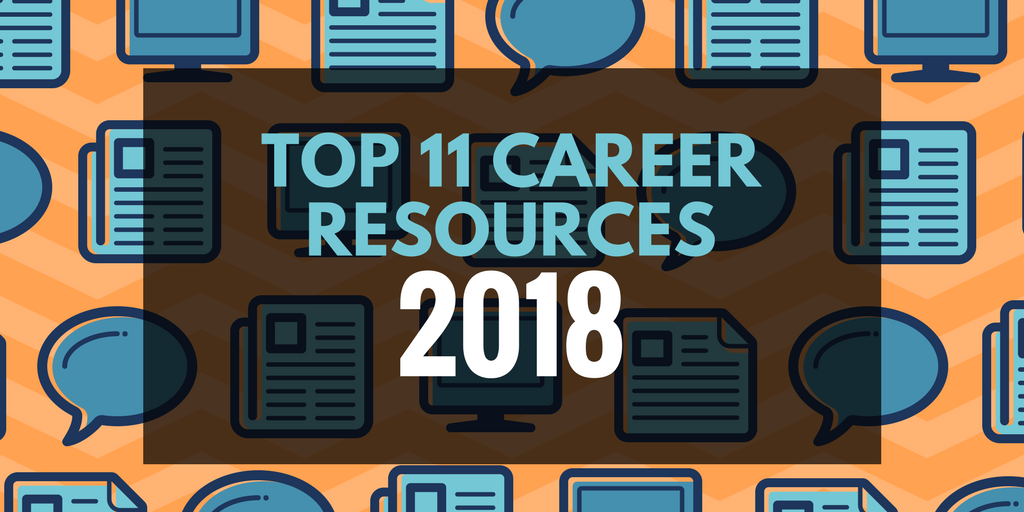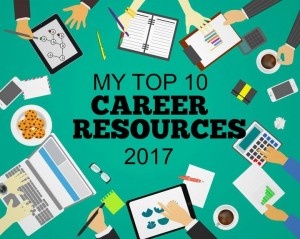Resources
Sign up here to get my free Personal Brand Quiz! This 5–10 minute quiz will help you define (or redefine) your personal brand—a key step in your You research!
In addition to that, every year, I share what resources are most relevant/helpful/useful to managing a career. Whether you’re job searching, raising your visibility, or needing a bit of inspiration, I’ve got you covered.

Here are my Top 10 Career Resources for 2020:
- My top 3 places for job postings: LinkedIn Jobs, Indeed, and Google (in the search bar, type the job title + “jobs,” e.g., “project management jobs”)
- Getting (More of) What You Want: How the Secrets of Economics and Psychology Can Help You Negotiate Anything, in Business and in Life by Margaret Neale and Thomas Lys—This book challenges much of what we’ve been told about negotiating (your new salary, for example). And who doesn’t want to feel more confident about the whole process?
- Personal Best—My current favorite podcast offers a quirky look at self-improvement. Personal Best is produced by the CBC so maybe its appeal is my Canadian sense of humor. I’ll find myself cringing and laughing at the same time.
- LinkedIn Learning—A few years ago, LinkedIn bought online learning site Lynda, and they’ve invested in a lot of new video content. You’ll find everything from productivity tips to ways to improve specific software skills. (Available with paid accounts)
- VolunteerMatch—Being around people can be good for your psyche, and it feels great to give back. Plus, it adds structure to your day, can raise your visibility with new networks, and gets you out of the house.
- Professional organizations—I’m seeing a trend in more face-to-face professional interactions. Maybe it’s because more people are working from home (which can be isolating for many) or simply because we all need human connection. Whatever the reason, a professional organization—either one that is directly tied to your professional area of expertise (e.g., Meeting Planners International) or one that gathers a cross-section of people together (e.g., a Meet Up)—can expand your professional network nicely. If you’re wondering what types of professional organizations or trade associations are out there, start here. Also try the Directory of Associations.
- Background Images for LinkedIn profile—Did you know you can change the background image on your LinkedIn profile? Not your profile pic (that is current and up to date, right?) but one to replace the generic blue background at the top of your LinkedIn profile. I often recommend my clients use Unsplash for LinkedIn background images. It’s easy to use, and the images are all available for use—for free!
- “Why the Best Hire Might Not Have the Perfect Resume”—This TED Talk proves that we’re so much more than our resume.
- CreativeLive—Like Udemy, this site offers online education. Taught by experts, these classes are nice way to jump-start bringing more creativity into your life. I’m working on improving my writing with “Writing Bios that Get Noticed” and “How to Get Emotion onto the Page.”
- NorthxNW: A Designing Your Life Experience—I’m partnering with a dear colleague to offer some new workshops based on the transformational and innovative approach developed at the Stanford Life Design Lab. I’d love to see you at a workshop this year.

Here are my Top 10 Career Resources for 2019:
- Rescue Time—Have you ever uttered “I don’t have time to look for a job”? Track how you spend your time online and on your computer, and you just might discover you’ve got more time than you think. Work smarter, not harder.
- Designing Your Life: How to Build a Well-Lived, Joyful Life by Dave Evans and Bill Barnett—My current favorite exercise is the Odyssey Plan where you create visual/graphic time lines of several five-year career plans.
- JobScan—See how well your resume and LinkedIn profile compare against your target job descriptions. This is a good DIY tool if you’re not getting interviews but you’re qualified.
- YouScience—This inexpensive career assessment not only measures interests and personality (like the standard Myers-Briggs or Strong Interest Inventory) but natural aptitudes too. Their niche is high school and college students, but the assessment is valid for all age groups.
- The Confidence Code: The Science and Art of Self-Assurance—What Women Should Know by Katty Kay and Claire Shipman—Read. This. Book. So many of my clients think their confidence issues are unique to them. Not a chance. Some interesting insights for men too—especially if their confidence is a bit shaky. And for those who want a quick read first, this article in the Atlantic is a good summary.
- Salary.com and Glassdoor for salary research—How much should I be making? With salaries all over the board, start with these two sites as a baseline for your analysis.
- Numbeo—And speaking of salaries, what about cost of living adjustments if you’re considering a move? Numbeo is my favorite resource and is recommended by HR professionals.
- Mac’s List, if you’re in Portland, OR (expanding to Seattle in 2019)—This resources has job listings, lots of free research resources, and in April 2019 I’ll be featured on their podcast (shameless plug!)
- Hunter.io—I use this when I want to find someone’s email address, usually to avoid having to use LinkedIn’s messaging system. (Sorry, LinkedIn, but your messaging system is terribly cumbersome.)
- Work-from-home or telecommuting job sites—Most job sites let you choose this filter in their job searches, but there are a few sites that I recommend if you’re specifically looking for remote opportunities, beyond technology jobs: flexjobs.com, www.weworkremotely.com, and www.virtualvocations.com.

Here are my Top 10 Career Resources for 2018:
- brain.fm. Music designed to increase focus by influencing your cognitive states. It sounds super woo-woo, but it’s fantastic when you need to focus on those time-consuming job applications without a ton of distractions. I use brain.fm when I write resumes and blog posts. It really works.
- You Are a Badass at Making Money by Jen Sincero. Don’t let the subtitle “Master the Mindset of Wealth” throw you off. Read this one if you need a kick in the pants because you find yourself clinging to job security (which, by the way, doesn’t really exist) or if you’re really, really tired of hearing yourself tell the same old lame stories, over and over again, about why you can’t do something/pursue a dream/have what you want.
- You Are a Badass. This was the first Jen Sincero book I read. It’s inspiring, funny, and strangely encouraging. If you’re thinking about changing jobs, making a career pivot, or reinventing yourself, read this book first.
- LinkedIn Jobs. In 2018 LinkedIn is more about recruiting than networking. On the desktop version—go to the “Jobs” tab. Or download the “LinkedIn Job Search” app. The app and the desktop versions are a little different so experiment to see which one works best for you. You’ll know if your LinkedIn profile is targeted (thus improving your chances of showing up in a search) by a couple of things. Recommended jobs are one of the clues LinkedIn provides.
- Resume Assistant in Word (you need an Office365 subscription). If you haven’t written a resume in a very, very long time, start here in Microsoft’s Word. Start your resume and the “Resume Assistant” will pop up, giving you access to real world examples from LinkedIn so you can see how other professionals in your industry, with similar titles, have positioned their experience.
- How I Built This podcast. Realizing that many companies start with a simple idea and lots of hard work feeds my optimism. Hard to pick a favorite episode, but Brian Scudamore’s (1-800-Got-Junk) career epiphany/light bulb moment is the epitome of planned happenstance.
- Career Sherpa. Follow Hannah on Twitter (@careersherpa). She’s always posting relevant and current ideas on how to use technology in the job search.
- The Dip by Seth Godin. I reread this book at least once a year—usually when I hit a road block that I can’t seem to push through. Godin provides clarity about whether I should push through or come to grips with quitting.
- This career stuff is stressful. My personal favorite is OTF—Orangetheory Fitness. I ride the roller coaster of career highs and lows with my clients and exercise helps me manage stress and balance my mental health. I’m an OTF fan because I don’t have to think about what I’m going to do—I just show up and get an intense workout.
- Google for Jobs is a new job search engine powered by Google. Job seekers can search for and apply to open positions directly from Google search. It’s like Indeed.com, which pulls job listings from many different sources. The difference is the power of AI and Google’s extensive filters. Here’s an article that explains it.
- Fotosnap.co. This Portland-area company provides head shots from around the city. You get to pick your location with natural lighting, show up, get a shot done in 20 minutes or so. Plus there’s a 10% discount for my clients!
Here are my Top 10 Career Resources for 2017:
1. LinkedIn Jobs. LinkedIn is always tweaking the interface and features and if, in 2017, you’re not using the Jobs feature in LinkedIn, you should be. Here’s a tutorial. Still employed and doing a below-the-radar job search? Tips here.
2. Choose Yourself by James Altucher. A client recommended this book and now I suggest it when a tough-love, no-holds-barred reality check about your career (and your future) is needed.
3. Quiet: The Power of Introverts in a World that Won’t Stop Talking by Susan Cain is a game-changing book on the power of introversion. Check out her website and follow Susan on LinkedIn.
4. Miracle Morning. You know how you hear about something one day and then the next day you seem to see it everywhere? That’s what happened with Miracle Morning by Hal Elrod. There’s almost a cult-like following for his morning practice. I love structure and believe in the power of self-development so if you’re looking to change your life, why not try it? Oh, and if you’re stuck in your job search or feeling discouraged, it just might help you get over that hump too.
5. Changing Careers. Feeling out-of-the-game and stale? Wondering if it’s too late to change careers or reinvent yourself? Here are 10 individuals who rocked it in their “encore” years. Get inspired and then go ahead and make some bold, new career goals. And if you need help getting clear about your marketability and strategy, call me.
6. The Dream Job. If you’re considering a new career and you’re looking for assessments that will match you to your “ideal job” (trust me, they can’t, but I know how irresistible it is to at least try), here’s a convenient list of online quizzes – many of them free or low-cost.
7. Infographic Resumes. You’re at work and you spot a pile of resumes on top of your boss’ desk. She’s interviewing candidates to join your team. Some of the resumes are so, um, visual. Are these type of resumes the new normal? Maybe. I’m recommending one-page, graphic resumes to many of my clients — but not for online applicant tracking systems, of course.
8. Inspirational Career Quotes. Inspirational, funny and sometimes profound career quotes, like: Too many of us are not living our dreams because we are living in our fears. – Les Brown
9. So Good They Can’t Ignore You: Why Skills Trump Passion in the Quest for Work You Love by Cal Newport. Cal coined the phrase “career capital” which he defines as the skills you have that are both rare and valuable and that can be used as leverage in defining your career. My clients hear “career capital” a lot. I use the term in a broader sense – career capital is what makes you most marketable/valuable to potential employers.
10. Mindset by Carol Dweck. If you’re feeling stuck in your career or you’ve had a few career setbacks that have left you feeling like there’s something wrong with you, read this book.

